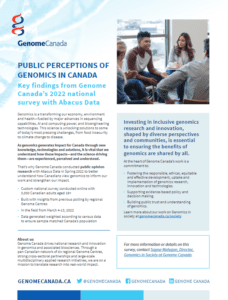Home / How we work / Genomics in society / Key findings: Public perceptions of genomics in Canada survey
Public perceptions of genomics in Canada
Genomics is unlocking solutions to some of today’s most pressing challenges—from food insecurity to climate change, to disease. And public understanding and perceptions of this revolutionary science play a pivotal role in shaping how it is adopted and deployed to tackle major challenges facing Canadians.
That’s why, at the heart of our research and innovation initiatives—and impact—is a commitment to:
- Fostering the responsible, ethical, equitable and effective development, uptake and implementation of genomics research, innovation and technologies.
- Supporting evidence-based policy and decision making.
- Building public trust and understanding of genomics.
Quick read
2022 Abacus Data survey
We teamed up with Abacus Data in Spring 2022 to conduct public opinion research to better understand how Canadians view genomics—especially given its role in the national COVID response—to inform our work and help strengthen our impact.
Explore key findings from the survey
Building on existing efforts led by the six regional Genome Centres, a custom national survey was developed. The survey was conduced online with 3,000 Canadian adults aged 18+. The survey was in the field from March 4-13, 2022. Data generated by the survey were weighted according to census data to ensure that the sample matched Canada’s population.
Canadians believe genomics can and should solve our greatest challenges
- By a significant margin, Canadians think genomics should be used to help solve some of the world’s most significant challenges (58%), although some (15%) think the risks outweigh benefits. One quarter (27%) are not sure. Support for specific applications of genomics across sectors, such as targeting particular diseases, is very high.
Support for specific applications
- Support for the use of genomics was highest for diagnosis and treatment planning for cancer (81%), rapid diagnosis of rare disease (79%) and identifying, tracking and containing COVID (77%). In areas outside human health, support for use of genomics was also high in such areas as bee colony protection (75%), invasive pest control in forests (75%), mining runoff water cleanup (73%), and livestock methane reduction (70%), among others.
Strong support for investment in Canada’s genomics future
- There is widespread support for investing more in genomic research, especially when tied to delivering health and disease-related benefits. More than 7 in 10 Canadians think the government should invest the same amount or more in genomics research. Only 9% think there should be less investment.
- When asked about investment specifically into the genetic causes of disease, for example, support is higher: more than half (57%) want more investment and 78% want the investment to be the same or more. Only 7% want the government to invest less.
Canadians are aware and interested in learning more
- Awareness of genomics is modest (31% at least somewhat familiar). Respondents were prompted with a brief description of genomics as the study of living things such as people, animals, and plants, their entire DNA sequence, and how all our genes work together in our biological system. With this definition in mind, a quarter of Canadians have never heard of the term while 44% have heard about it but admit to not knowing much about it.
- Importantly, there is considerable interest among Canadians in learning more about genomics. In fact, 70% of Canadians are interested or somewhat interested in learning more about genomics.
Impressions of genomics are positive overall
- Overall impressions of genomics are positive as virtually no one holds a negative view and 44% are either positive or somewhat positive. Familiarity with genomics is associated with being more positive. Those that are not positive are mostly either not sure (26%) or have mixed feelings about genomics (27%).
- The pandemic experience has increased Canadians’ awareness of genomics, with 41% reporting that they definitely or somewhat became more aware as a result of COVID-19. The majority (64%) know that genomics was used during the pandemic. The pandemic experience has notably improved public impressions of genomics, with 55% being more positive or somewhat more positive about their feelings.
Looking ahead
The results from this survey, as well as surveys undertaken by our regional Centres, will inform and shape our ongoing engagement, outreach and communication activities to drive knowledge mobilization and impact.
For more information or details on this survey, contact Sapna Mahajan, Director, Genomics in Society at Genome Canada.
Partners and Collaborators




THE CANCOGEN NETWORK IS:

VIRUSSEQ
Sequencing up to 150,000 viral samples from people testing positive for COVID-19, we hope to improve tracking of how the virus is changing and spreading, providing key data on virus transmission trends and changes in the virus that may impact viral detection or the effectiveness of treatments or vaccines.

HOSTSEQ
Sequencing the genomes of up to 10,000 patients diagnosed with COVID-19 (the “hosts”), we hope to better understand how the virus impacts individuals in different ways in hopes of better understanding patterns and trends amongst certain individuals.

